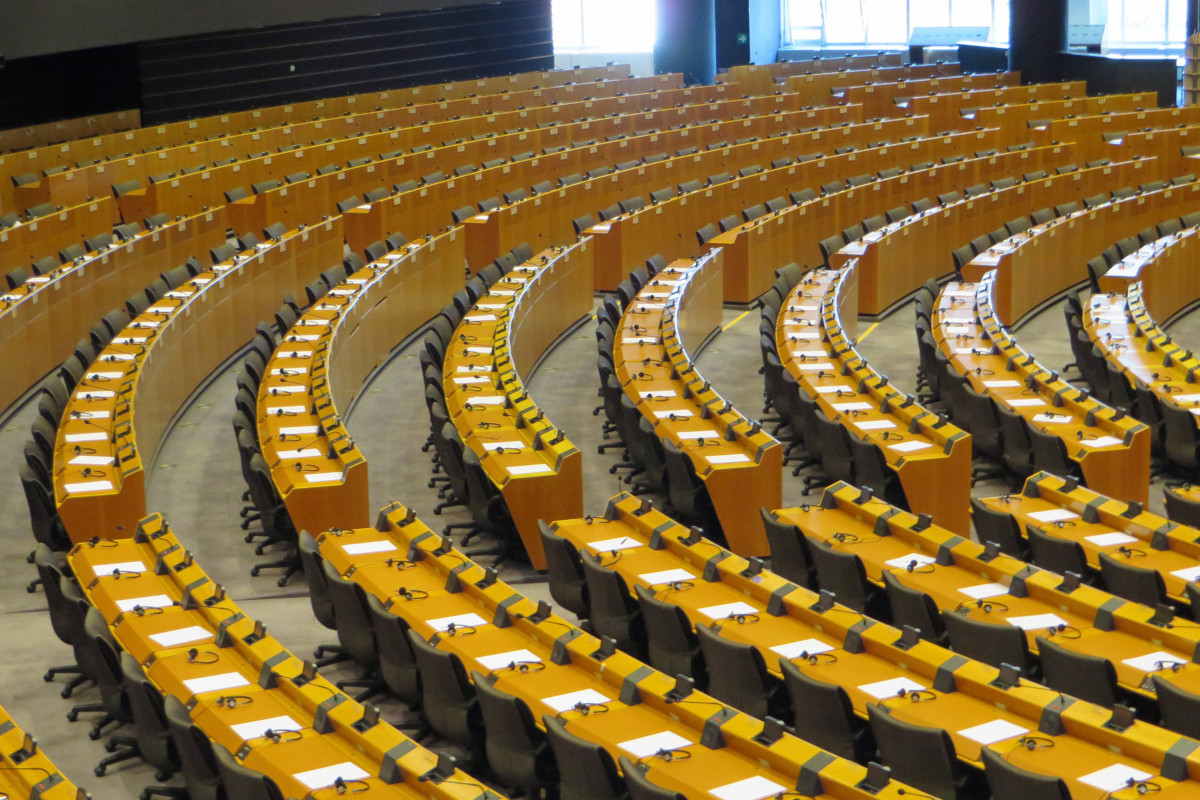EU: Dangerous loophole in the AI Act must be closed to protect rights
Topic
Country/Region
07 September 2023
Almost 120 civil society organisations, including Statewatch, are calling on MEPs to close a massive loophole in the proposed Artificial Intelligence Act introduced under pressure from big tech lobbyists. Without changes, the law will allow developers of AI systems to decide whether or not the systems they produce should be considered "high-risk" or not - an obvious invitation for them to decide that they are not, in order to avoid the extra safeguards that the Act should impose.
Support our work: become a Friend of Statewatch from as little as £1/€1 per month.

Image: Ben Tilley, CC BY 2.0
The statement was coordinated by European Digital Rights.
EU legislators must close dangerous loophole in AI Act
The European Union is entering the final stage of negotiations on its Artificial Intelligence Act (AI Act), but Big Tech and other industry players have lobbied to introduce a major loophole to the high-risk classification process, undermining the entire legislation. We call on EU legislators to remove this loophole and maintain a high level of protection in the AI Act.
The EU AI Act has the potential to improve protections for people impacted by AI systems. In its original form, it outlined a list of ‘high-risk uses’ of AI, including AI systems used to monitor students, to assess consumers’ creditworthiness, to evaluate job-seekers, and to determine who gets access to welfare benefits.
The legislation requires developers and deployers of such ‘high-risk’ AI to ensure that their systems are safe, free from discriminatory bias, and to provide publicly accessible information about how their systems work. However, these benefits will be undermined by a dangerous loophole introduced into the high-risk classification process in Article 6.
In the original draft from the European Commission, an AI system was considered ‘high risk’ if it was to be used for one of the high-risk purposes listed in Annex III. However, the Council and the European Parliament have introduced a loophole that would allow developers of these systems decide themselves if they believe the system is ‘high-risk’.i The same company that would be subject to the law is given the power to unilaterally decide whether or not it should apply to them.
These changes to Article 6 must be rejected and the European Commission’s original risk- classification process must be restored. There must be an objective, coherent and legally certain process to determine which AI systems are ‘high-risk’ in the AI act.
If the changes to Article 6 are not reversed, the AI Act will enable AI developers to decide to exempt themselves from all substantive rules for high-risk systems. The AI Act would:
- Introduce high legal uncertainty as to which systems are considered ‘high risk’;
- Lead to fragmentation of the EU single market, with different interpretations of what constitutes ‘high-risk’ across Member States;
- Result in Member State authorities facing severe challenges to enforce the legislation, without enough resources to monitor developers’ self-assessment sufficiently;
- Allow unscrupulous developers to avoid the basic requirements of the law that are meant to make their systems safer and more This would put responsible AI developers at a disadvantage.
We urge lawmakers to reverse these changes and restore the Commission’s original language in Article 6. The AI Act must prioritise the rights of people affected by AI systems and ensure that AI development and use is both accountable and transparent.ii
Signed,
- Access Now
- BEUC – The European Consumer Organisation
- European Digital Rights (EDRi)
- Access Info Europe
- AlgoRace
- Algorights
- AlgorithmWatch
- All Faiths and None
- All Out
- Alternatif Bilisim (AiA-Alternative Informatics Association)
- Amnesty International
- ARSIS Association for the Social Support of Youth
- Article 19
- Asia Indigenous Peoples Pact
- Aspiration
- Association for Legal Studies on Immigration (ASGI)
- Association Konekt
- Balkan Civil Society Development Network
- Bits of Freedom
- Bulgarian center for Not-for-Profit Law (BCNL)
- Center for AI and Digital Policy (CAIDP)
- Chaos Computer Club
- Civil Rights Defenders
- CIVIL SOCIETY ADVOCATES
- CNVOS Slovenia
- Coalizione Italiana Libertà e i Diritti civili
- Comisión General Justicia y Paz de España
- Controle Alt Delete
- Corporate Europe Observatory (CEO)
- D64 - Zentrum für Digitalen Fortschritt V.
- DanChurchAid (DCA)
- Danes je nov dan, Inštitut za druga vprašanja
- Defend Democracy
- Democracy Development Foundation Armenia
- Digitalcourage
- Digital Security Lab Ukraine
- Digitale Gesellschaft
- Digitalfems
- DonesTech
- dTest, p.s.
- Eticas
- EuroMed Rights
- European Anti-Poverty Network (EAPN)
- European Center for Not-for-Profit Law
- European Civic Forum
- European Movement Italy
- European Network Against Racism (ENAR)
- European Network on Statelessness
- Fair Trials
- Fair Vote UK
- Fundación CIVES
- Federación de Consumidores y Usuarios CECU
- Federación de Sindicatos de Periodistas (FeSP)
- Federation of German Consumer Organisations (Verbraucherzentrale Bundesverband – vzbv)
- FIPR
- Fritidsodlingens Riksorganisation
- Gong
- Greek Forum of Refugees
- Health Action International
- Homo Digitalis
- Hungarian Civil Liberties Union
- I Have Rights
- IDAY Liberia Coalition
- Institute Circle
- Institute for Strategic Dialogue (ISD)
- Irish Council for Civil Liberties
- IT-Pol
- Iuridicum Remedium
- KEPKA- Consumers Protection Center
- Kif Kif vzw
- KOK German NGO Network against Trafficking in Human Beings
- Konsumentvägladarnas Förening
- Kosovar Civil Society Foundation (KCSF)
- LA LIGUE DE L'ENSEIGNEMENT
- La Strada International
- cat
- LDH (Ligue des droits de l'Homme)
- Legal Centre Lesvos
- Liberty
- Ligue des droits humains
- Metamorphosis Foundation
- Migrant Tales
- Mobile Info Team
- Moje Państwo Foundation
- National Federation of Polish NGOs (OFOP)
- National NGO Coalition
- New Europeans International
- Norwegian Consumer Council
- Novact
- OCU (ORGANIZACIÓN DE CONSUMIDORES Y USUARIOS)
- Ökotárs - Hungarian Environmental Partnership Foundation
- Open Knowledge Foundation Germany
- Panoptykon Foundation
- Partners Albania for Change and Development
- PIC - Legal Center for the Protection of Human Rights and the Environment
- Platform for International Cooperation on Undocumented Migrants (PICUM)
- Polish Women's Strike Foundation
- Politiscope
- Privacy First
- Privacy International
- Privacy Network
- PRO, Pensionärernas riksorganisation
- Promo-LEX Association
- Prostitution Information Center
- Protection International
- Red en Defensa de los Derechos Digitales
- REPONGAC
- SKPF Pensionärerna
- SOLIDAR & SOLIDAR Foundation
- Spiralis
- Statewatch
- Stichting LOS
- Superbloom (previously known as Simply Secure)
- Swedish Asthma and Allergy Association
- SYMBIOSIS
- Symbiosis - Council of Europe School of Political Studies in Greece
- The Swedish Consumers' Association
- Wikimedia Deutschland V.
Our work is only possible with your support.
Become a Friend of Statewatch from as little as £1/€1 per month.
Further reading

EU: Civil society calls for rights to be prioritised in secret AI Act "trilogue" negotiations
Secret negotiations between the Council of the EU, European Parliament and European Commission on the Artificial Intelligence Act have begun, more than two years after the legislation was proposed. A statement signed by more than 150 civil society organisations, including Statewatch, calls for fundamental rights to be put at the centre of the talks.

Open Letter to the Spanish Presidency of the Council of the European Union: Ensuring the protection of fundamental rights on the AI Act
With the European Parliament and Council of the EU heading for secret trilogue negotiations on the Artificial Intelligence Act, an open letter signed by 61 organisations - including Statewatch - calls on the Spanish Presidency of the Council to make amendments to the proposal that will ensure the protection of fundamental rights.
Spotted an error? If you've spotted a problem with this page, just click once to let us know.

